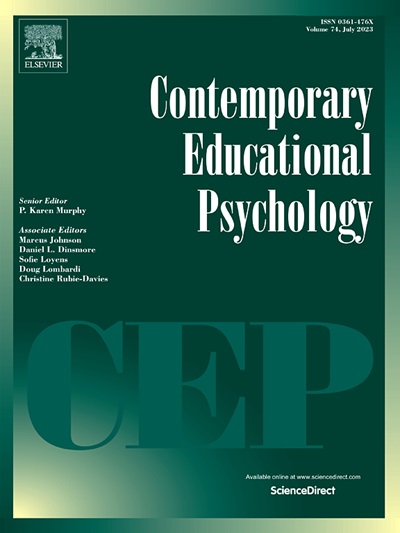对于不同的适应动机而言,环境有些相似:机器学习揭示出最佳动机环境涉及父母、教师和同伴的集体支持
IF 3.8
1区 心理学
Q1 PSYCHOLOGY, EDUCATIONAL
引用次数: 0
摘要
成就动机是人类繁衍生息的根本。虽然已经提出了许多适应性动机建构,但人们往往孤立地研究它们,而不考虑其共同的背景根源。为了确定不同形式的适应性成就动机的背景因素,我们通过整合全球学生评估数据集(n = 77,068 名中学生,来自 19 个国家,Mage = 15.79)进行了综合分析。我们进行了文献综述,确定了 27 个理论和实证上与成就动机相关的潜在预测因素,包括数据集中的直接环境因素和不同来源的远端环境因素。机器学习分析的结果显示,适应性动机的情境预测因素(自我效能感、学习目标和任务掌握导向)具有趋同模式。具体来说,适应性动机的最佳环境是父母、教师和同伴的集体积极影响,而不是完全依赖于其中一方。相比之下,其他适应性较差的动机建构(固定心态、成绩目标和对失败的恐惧)的模式则具有特异性。这些发现提供了整合成就动机研究的综合证据,强调了各种适应性动机的共同背景基础。这种综合方法阐明,最佳的动机环境涉及父母、教师和同伴的集体社会支持。本文章由计算机程序翻译,如有差异,请以英文原文为准。
The environment is somewhat alike for different adaptive motivations: Machine learning reveals optimal motivational contexts involve collective support of parents, teachers, and peers
Achievement motivation is fundamental for human flourishing. While numerous adaptive motivational constructs have been proposed, they are often examined in isolation without considering their shared contextual roots. To identify the contextual factors underlying different forms of adaptive achievement motivation, we conducted comprehensive analyses by integrating a global student assessment dataset (n = 77,068 middle-school students across 19 countries, Mage = 15.79). We conducted a literature review and identified 27 potential predictors theoretically and empirically related to achievement motivation, including immediate contextual factors available in the dataset and distal contextual factors available from varying sources. Results from machine learning analyses showed convergent patterns of the contextual predictors for adaptive motivation (self-efficacy, learning goals, and task mastery orientation). Specifically, the optimal environment for adaptive motivation is characterized by the collective positive influence of parents, teachers, and peers, rather than depending on one exclusively. In comparison, the pattern of other less adaptive motivation constructs (fixed mindsets, performance goals, and fear of failure) is idiosyncratic. These findings provide synthesized evidence consolidating achievement motivation research, highlighting the shared contextual foundations for various adaptive motivations. This integrative approach clarifies that the optimal motivational contexts involve the collective social support of parents, teachers, and peers.
求助全文
通过发布文献求助,成功后即可免费获取论文全文。
去求助
来源期刊

Contemporary Educational Psychology
PSYCHOLOGY, EDUCATIONAL-
CiteScore
16.50
自引率
3.90%
发文量
74
期刊介绍:
Contemporary Educational Psychology is a scholarly journal that publishes empirical research from various parts of the world. The research aims to substantially advance, extend, or re-envision the ongoing discourse in educational psychology research and practice. To be considered for publication, manuscripts must be well-grounded in a comprehensive theoretical and empirical framework. This framework should raise critical and timely questions that educational psychology currently faces. Additionally, the questions asked should be closely related to the chosen methodological approach, and the authors should provide actionable implications for education research and practice. The journal seeks to publish manuscripts that offer cutting-edge theoretical and methodological perspectives on critical and timely education questions.
The journal is abstracted and indexed in various databases, including Contents Pages in Education, Australian Educational Index, Current Contents, EBSCOhost, Education Index, ERA, PsycINFO, Sociology of Education Abstracts, PubMed/Medline, BIOSIS Previews, and others.
 求助内容:
求助内容: 应助结果提醒方式:
应助结果提醒方式:


